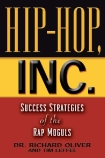Hip-Hop, Inc.
Success Stories of the Rap Moguls
by Richard W. Oliver and Tim Leffel
Excerpt from Chapter 1
The Game: Reaping Rap's Riches
This book is about "the game": the multi-million dollar businesses at the center of the multi-billion dollar global hip-hop industry.
It is a story being told for the first time from a strictly business perspective. While rap music and hip-hop cultural products (clothes, jewelry, cars, financial services, publishing, travel, etc.) now dominate many of their product and service categories, this book is not about the music or the bling. There are plenty of books, articles, TV shows and even movies that do that well. Hip-Hop, Inc. is about the businesses that the music and the bling created. And, it’s about how those businesses now create even more music and more bling.
Hip-Hop, Inc. tells the story of how the businesses were founded and why they are so successful. More interestingly, though, it describes the people behind (or in many cases, way out in front of) the businesses, as well as the principles and practices they’ve used to become so phenomenally successful.
The financial success of hip-hop should be of more than passing interest to anyone in business solely on the fundamentals alone. They are truly remarkable: multi-million-dollar empires with global reach, selling a huge variety of products to some of the most desirable demographics (young, high income, acquisitive, interested in luxury products. These empires own brands that are rapidly approaching icon status, most developed just in the last decade or two.
The hip-hop entrepreneurs are not the first African-Americans to create their own businesses, even on the scale that they have. There are those such as Robert L. Johnson, who created Black Entertainment Television (BET), or Cathy Hughes, who created the national radio network Radio One. In the main, however, early pioneers of large, black-owned and operated businesses were largely oriented to selling the black experience to the black community. Hip-hop is also about selling the black experience to white America and to audiences around the world.
Nor are the hip-hop entrepreneurs the only successful African-America business executives. Black executives, while not found to the extent they should be at the center of Corporate America, are now running such venerable institutions as Merrill-Lynch (Stanley O Neal, COO), AOL Time Warner (Richard Parsons, CEO) and American Express (Ken Chenault, CEO). But, many of these black corporate executives-like their white CEO colleagues--are the product of America’s best schools and country clubs. Many of the hip-hoppers, by contrast, while not from the ghetto, grew up "one street over.
While they often cultivate a "ghetto origin as part of their image, many, like Russell Simmons, Kanye West and Diddy, grew up in middle class homes with parents in the professions. Some even "flirted with private schools and universities. Some of the artists and entrepreneurs, such as Tupac Shakur, Snoop Dogg, Suge Knight, Master P, and 50 Cent, came from the poorest parts of urban America and lived what rappers refer to as the "thug life. 50 Cent (or "Fiddy as he’s often referred to) even boasts "eight gunshot wounds as an integral part of his persona. Impressively, the most successful hip-hoppers were able to translate their street smarts into business smarts with amazing ease.
Hip-hop artists and entrepreneurs often refer to the hip-hop business as "the game, but unlike a fleeting sporting event, they recognize that the rules are unforgiving, the personal and professional demands unceasing, but the potential rewards are staggering.
"Take it to another level, knowI'msayin?"
Hip-hop growth and development is so much more spectacular when considered in the context of the competition for the "cultural dollar of some the world’s most entrenched suppliers (Sony, Viacom, Calvin Klein, Electronic Arts, Pernod Ricard, Giorgio Armani etc.) in each product category in which it competes.
The music industry, though driven by hits and new artists, is in many ways an old line conservative industry, set in its ways and dedicated to its unshakable genres: pop, rock, easy-listening, country, jazz, and classical. Over the past few decades, only hip-hop has made a lasting dent. Along with country music, it now dominates the sales charts.
The same may be said of other product categories, such as upscale clothes and jewelry, where established brands and producers dominate a very mature industry. Again, while "the newest fashion is the de rigor operating mode, at their core, these industries rigidly protect their turf and reject innovation from the outside. A few new designers do break in, but before you could be sure none of them came from the South Bronx.,
The big break, the big idea, the turning point (or as business professors would say, the strategic inflection point) for hip-hop, came from a single idea: own the music!



